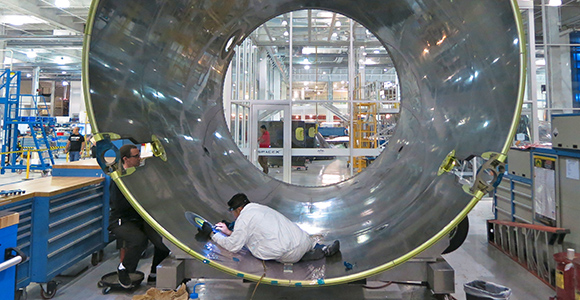
(Photo Credit: Steve Jurvetson/Flickr)
California’s manufacturers contribute more than ten percent to the state’s economy and it’s the job of quality control staff to ensure products meet appropriate standards. In the Bay Area alone, there are 12,000 quality control inspectors and an ongoing demand for 400 new inspectors every year. This fall, two new classes and a new certificate program developed by a regional collaboration between community colleges and industry will be introduced to prepare workers to take on the challenges of quality inspection.
Recognizing the demand for quality inspection and quality assurance workers, Deputy Sector Navigator Mark Martin formed a community college collaboration comprised of De Anza College, Laney College, San Jose City College and Santa Rosa Junior College. The collaborative invited industry experts from more than 20 companies to a series of exploratory meetings. The goal? Assess the real needs of manufacturing and how community colleges could help train workers to meet those needs.
“I found myself invited to a meeting,” said Aaron Haynes, manager of business operations at Inland Metal Technologies. “We talked about what’s needed and how you get new graduates ready for work in quality.”
Other industry collaborators included representatives from Brinderson, FM industries, Inc., Rolls-Royce Engine Services-Oakland Inc., Inland Metal, Lawrence Livermore National Labs and Manex Consulting.
Together with the group, Haynes worked to establish the attributes and skills required of a quality inspector, generated ideas about the best ways to provide that learning and shared the current reality of quality inspector training.
Though some of the local community colleges had a class or two covering quality control topics, there was no overall educational pathway for quality inspectors. They needed a curriculum that would prepare quality control technicians in the detailed skills needed by inspectors as well as a fundamental understanding of the role quality assurance and control plays in a company.
“Often we get people in who do well at an entry-level position and because they do well, they are tapped on the shoulder for a position in quality,” Haynes explained. Though the “promote from within” strategy is a good one, there is a lot of knowledge that is needed to understand the role quality control plays in a company and the technical training necessary to maximize the role of a quality inspector.
With a clear directive to develop a curriculum that would equip future quality inspectors with the knowledge required to fill industry positions, Martin and his team applied for and received Regional CTE Funds. The funds are part of Doing What Matters for Jobs and the Economy from the 2014-15 state budget to support the California Community Colleges in meeting the needs of regional labor markets.
The collaborative used the awarded Regional CTE Funds to purchase specialized equipment and craft a Quality Control Technician Certificate that can be completed in two semesters and features two new classes. The first class, Introduction to Quality Assurance, “uses a systematic approach that takes a step back and looks at the way quality fits into the way a company operates,” said Haynes. The second class, Dimensional Metrology, introduces the technical aspects of measuring physical component parts.
In the fall, those incumbent, promotable workers as well as those new to the industry, will be able to start the two-semester certificate program. In addition to the direct jobs in quality control, there are a number of jobs such as machinists, manufacturing managers, engineers, lab technicians and production workers that can benefit from these classes. Martin expects 20–30 students to register for the QC classes initially at the participating colleges with that number increasing to about 100 per year once all the collaborating colleges are up and running.
Haynes is looking forward to both the launch and the growth of the program. “It’s not meant to be just wood or metal even circuits. The need is universal,” he said. “There’s always a need for quality inspectors.”

